| 120 mm 50 caliber Pattern 1905 | |
|---|---|
 An open twin-mount Pattern 1905 in Finnish service. | |
| Type | Naval gun Coastal artillery Railway artillery |
| Place of origin | Great Britain |
| Service history | |
| In service | 1905-1950's |
| Used by | Russian Empire Soviet Union Finland |
| Wars | World War I Russian Civil War Winter War World War II |
| Production history | |
| Designer | Vickers |
| Designed | 1905 |
| Manufacturer | Vickers Obukhov State Plant |
| Produced | 1905 |
| No. built | 210 |
| Specifications | |
| Mass | 3.1 t (3.4 short tons) |
| Length | 6 m (19 ft 8 in) 50 caliber |
| Barrel length | 5.8 m (19 ft 0 in) |
| Shell | Fixed QF ammunition |
| Shell weight | 20.4–29 kg (45–64 lb) |
| Calibre | 120 mm (4.7 in) |
| Elevation | Single mount: -10° to +20° Twin mount: -3° to +27°[1] |
| Traverse | 360° |
| Rate of fire | 6-7 rpm |
| Muzzle velocity | 792 m/s (2,600 ft/s) |
| Maximum firing range | 13.7 km (8.5 mi) at +20°[2] |
The 120 mm 50 caliber Pattern 1905 was a Russian naval gun developed by Vickers for export in the years before World War I that armed a variety of warships of the Imperial Russian Navy. Guns salvaged from scrapped ships found a second life as coastal artillery, railway artillery and aboard river monitors during the Russian Civil War.[2] It was estimated that there were 110 guns in the Soviet Navy's inventory in 1941. Of these, 39 were in the Baltic Fleet, 20 in the Black sea Fleet, 24 in the Amur Flotilla, 11 in the Pacific Fleet and 6 in the Pinsk flotilla in World War II.[1]
History
The Pattern 1905 began life as a Vickers design produced in Great Britain for export customers. The Pattern 1905 was also produced under license at the Obukhov State Plant in St. Petersburg, Russia.
Construction
The Pattern 1905 was a built-up gun which consisted of an A tube, three layers of reinforcing tubes, a jacket and a breech piece which screwed onto the jacket.[2] Once Obhukov started production the Vickers guns were referred to as model 1 guns, while those manufactured by Obukhov were referred to as model 2 guns.[3] By 1918 it was estimated that 180 guns had been completed with another 20 partially complete. A few more were finished between 1921-24 from existing stocks.[1]
Naval use
The Pattern 1905 guns armed armored cruisers, dreadnought battleships, gunboats, icebreakers and river monitors of the Imperial Russian Navy and Soviet Navy built or refit between 1905-1924.
Armored cruisers
- Russian cruiser Rurik - The anti-torpedo boat armament of this ship consisted of twenty Pattern 1905 guns in casemates amidships.
Dreadnought battleships
- Gangut-class battleships - The four ships of this class had an anti-torpedo boat armament of sixteen Pattern 1905 guns in casemates amidships.
Gunboats
- Kars-class gunboats - The two ships of this class were built with a primary armament of two Pattern 1905 guns on open mounts.
- Gilyak-class gunboats - The four ships of this class were built with a primary armament of two Pattern 1905 guns on open mounts.
Icebreakers
River monitors
- Tayfun-class river monitors - The eight ships of this class were built with a secondary armament of four Pattern 1905 guns in two twin-turrets amidships.
Ammunition
Ammunition was of Fixed QF type and weighed between 20.4–29 kg (45–64 lb).
The gun was able to fire:
Photo Gallery
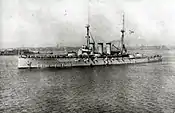 The Armored Cruiser Rurik in 1917.
The Armored Cruiser Rurik in 1917.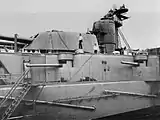 A view of the casemated Pattern 1905 guns amidships aboard the battleship Gangut.
A view of the casemated Pattern 1905 guns amidships aboard the battleship Gangut.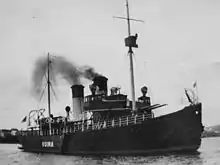 A view of the open twin-mount Pattern 1905 guns aboard the Finnish icebreaker Voima.
A view of the open twin-mount Pattern 1905 guns aboard the Finnish icebreaker Voima. The gunboat Gilyak.
The gunboat Gilyak.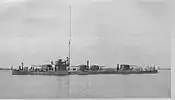 The gunboat Shkval of the Amur Flotilla.
The gunboat Shkval of the Amur Flotilla.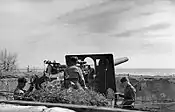 A single shielded Pattern 1905 gun in Finnish service.
A single shielded Pattern 1905 gun in Finnish service.
References
- Friedman, Norman (2011). Naval Weapons of World War One. Barnsley, South Yorkshire, UK: Seaforth. ISBN 978-1-84832-100-7.
Notes
- 1 2 3 DiGiulian, Tony. "Russia / USSR 120 mm/50 (4.7") Pattern 1905 - NavWeaps". www.navweaps.com. Retrieved 2017-07-29.
- 1 2 3 4 Friedman, Norman (2011). Naval weapons of World War One. S. Yorkshire: Seaforth Pub. ISBN 9781848321007. OCLC 751804655.
- 1 2 "FINNISH ARMY 1918 - 1945: HEAVY COASTAL GUNS". www.jaegerplatoon.net. Retrieved 2017-07-29.